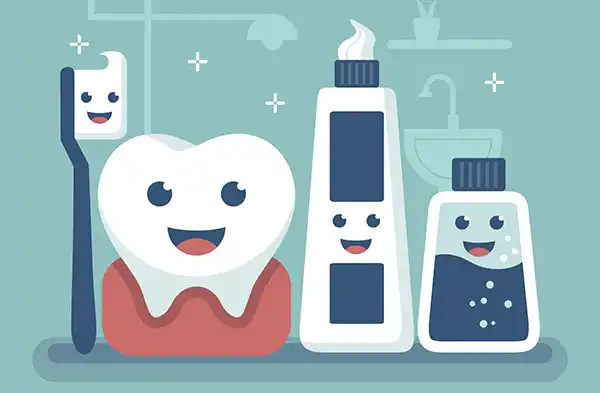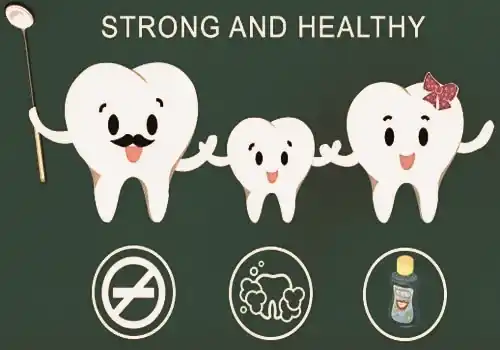Oral Health Milestones: Dental Care for Different Stages of Life

Oral health is an integral part of overall well-being. From the moment a baby’s first tooth erupts, dental look-after becomes a lifelong necessity. However, the needs and challenges of maintaining it evolve as a person passes through different stages of life. Understanding these milestones and tailoring teeth care accordingly is necessary for optimal oral health.
Why is Oral Health Care Important?

We all know that oral hygiene maintenance is vital, but why? In this section, we’ll be discussing some of the reasons to know why.
- Overall Health – The mouth is the door to the internal parts of the body and is also able to show early symptoms of systemic illness, such as diabetes. Research from Harvard shows that patients with periodontal disease are at a greater risk of having heart disease.
Keeping your teeth and mouth healthy will reduce the risk of many wellness complications.
- Prevent Tooth Loss – One of the most common dental problems faced by children and adults is tooth loss. Regularly brushing and flossing your teeth and keeping up with checkups can help maintain good oral well-being.
- For a Whiter and Brighter Smile – Who doesn’t like to have a good smile? Brighter and whiter teeth give the confidence to smile without hesitation.
- Reduce the Risk of Cancer and Dementia – According to a study on 65,000 postmenopausal women between the age of 54 to 86 found, those with a history of gum disease were 14% more likely to develop cancer. Of these, one in three developed breast cancer while there was also a highly-increased risk of lung cancer, esophageal, gallbladder, and skin cancers. Those who have healthy gums are also 70 percent less likely to develop Alzheimer’s disease than those who have suffered from gum disease over a long period.
So, mere brushing and flossing may not give you complete oral hygiene. To prevent any health-related hazard in the future, consult a dentist for regular checkups twice a year at least.
Dental Care for Different Stages of Life

Every age group needs a specific type of dental care. In this section, we’ll be explaining the oral look-after requirements according to age.
Newborns and Infants
The first dental milestone occurs during infancy. Even before the eruption of the first tooth, parents should begin practicing good sanitation habits. Wiping the baby’s gums with a clean cloth after feeding helps remove bacteria and establish a routine. As the first teeth emerge, typically around six months, parents should start using a soft-bristled brush and water to clean them. Avoiding sugary drinks and introducing a balanced diet lays the foundation for strong teeth and gums.
Toddlers and Preschoolers
Toddlers and preschoolers experience rapid growth and development, making care required during this stage. Children should visit a family dentist around their first birthday or when the first tooth appears. Regular check-ups help monitor teeth eruption, detect early signs of decay, and provide guidance on proper brushing techniques. Encouraging good oral hygiene habits, such as brushing twice a day with fluoride paste and limiting sugary snacks, sets the stage for a lifetime of strong smiles.
Elementary School Children
As children enter their school years, they become more independent in their care routine. However, parental supervision and guidance remain vital. Routine visits, ideally every six months, continue to be the main form of preventive care, including professional cleanings, fluoride treatments, and dental sealants. Education on the importance of flossing and proper brushing technique empowers children to take charge of their health.
The Teen Years
The teenage years mark a time of significant physical and emotional changes. Hormonal fluctuations may increase the hazard of gum disease and mouth infections. Adolescents should continue dentist visits, with an emphasis on reinforcing good oral hygiene practices. Dentists may also discuss the impact of tobacco, alcohol, and drug use on oral wellness, raising awareness of the associated risks.
Adults and Oral Health
Adulthood brings its own set of challenges and responsibilities. Busy schedules and stress often lead to neglecting oral health. However, maintaining regular visits is vital. Comprehensive exams can detect early signs of illness, such as gum disease, mouth cancer, and tooth decay. Professional cleanings remove plaque and tartar buildup, reducing the danger of gum disease. Adults should continue to brush twice a day, floss daily, and limit sugary foods and drinks to preserve their well-being.
Senior Citizens
As individuals reach their golden years, care becomes increasingly inherent. Aging can bring challenges like tooth loss, dry mouth, and gum disease. Routine check-ups help address these issues promptly. Proper denture look-after and sanitation, including brushing dentures and cleaning the mouth, are vital for maintaining health. Dentists may also guide nutritional needs and medications that may impact overall wellness.
Final Thoughts
Oral health milestones are present at every stage of life. From infancy to adulthood and beyond, dental care requirements evolve, reflecting the changing needs and challenges of each phase. Early intervention, regular dental visits, and consistent mouth hygiene practices are foremost for maintaining optimal well-being at any age. By understanding and adapting to these milestones, every person can ensure that they enjoy a healthy and beautiful smile throughout their lives.
Dental Tips:-
Coconuts are a natural antibacterial food that helps in reducing gum diseases and cavities.
Wait one hour after eating to brush your teeth to avoid enamel damage.
Low-alkaline foods such as cheese and milk after meals help in balancing the acidic effects of sugary foods.
Avoid crunching ice, it causes micro-cracks in your teeth.
Sticky food like toffee or caramel can break brace wires, pull off crowns, or loosen fillings.










